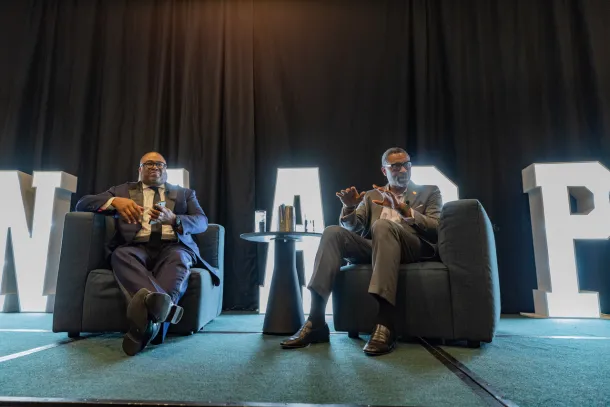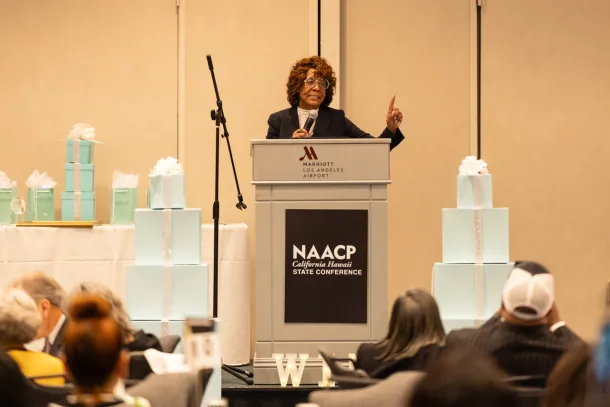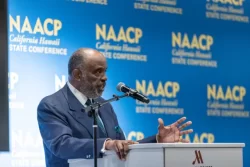
By Bo Tefu and Joe W. Bowers Jr., California Black Media
NAACP California-Hawaii State Convention Highlights Black Voter Engagement, and More
The 37th NAACP California-Hawaii State Convention concluded on Sunday, Oct 27 following four days of discussions and workshops at the Los Angeles Airport Marriott. Bringing together civil rights leaders, policymakers, and advocates from California and Hawaii, the convention operated under the theme “All In.” The participants discussed critical issues impacting Black communities, including criminal justice reform, health equity, economic empowerment, education, environmental justice, and voting rights.
A Friday panel featuring NAACP Chairman Leon W. Russell and Regina Wilson, Executive Director of California Black Media, examined Project 2025, an initiative perceived as a potential threat to civil rights, healthcare access, and environmental protections. This session emphasized Project 2025’s projected impact on Black communities, noting that policies within the initiative could diminish gains made in civil and environmental rights over decades. Russell and Wilson highlighted the need for vigilant monitoring and community mobilization to address these challenges.

On Saturday the President’s Fireside Chat brought together NAACP President Derrick Johnson and CA/HI State Conference President Rick Callender, who discussed the urgency of voter engagement and community advocacy.
Guest speakers included Congresswoman Maxine Waters (D-CA-43), who spoke at the Women in NAACP (WIN) Labor Luncheon about the intersection of labor rights and civil rights. California State
Superintendent Tony Thurmond delivered remarks at the Leadership Dinner on education equity, focusing on policies to ensure all students have access to high-quality education.
Honors were given to longtime social justice advocate and former Assembly member Mike

Davis for his work in community activism, while actor and activist Danny Glover and the Rev. Dr. Amos C. Brown received the 2024 Legacy Hall of Fame Awards, recognizing their lifelong commitments to advancing civil rights.
The convention also offered practical workshops, including “What’s On Your Ballot?,” where coalition leaders provided analyses of California propositions, explaining their potential impacts on community rights and resources. The Voter Turnout Workshop provide background and encouraged participants to promote voter turnout through community-centered outreach strategies.
Sunday’s events closed with a Prayer and Memorial Breakfast honoring the contributions of past and current civil rights leaders.
Secretary of State Weber: Voting in California Has Begun; Officials Release Early Ballot Return Stats
Last week, the office of California Secretary of State Shirley N. Weber provided updates on ballot return statistics for the Nov. 5 General Election.
Since the state began sending out ballots by mail earlier this month to all registered voters in all 58 counties, more than 2.8 million residents have voted. So far, the state has accepted 98% of those ballots, the majority of which were returned by mail.
Some residents cast their votes in-person, amounting to a total of 4,709 ballots.
The highest number of voter registration and ballot returns came from counties with dense populations such as Los Angeles County, San Francisco County, San Diego County, and Orange County.
On Oct. 25, the Secretary of State’s office partnered with Ethnic Media Services (EMS) and California Black Media (CBM) to host a news briefing on essential resources to prepare voters to cast their ballots properly and inform them about what the state is doing to protect their votes.
“As long your ballot is postmarked by election day, November 5th,
and received by November 12th, it will be processed and counted,” said Joe Kocurek, Deputy Secretary of State for Communications, during the briefing.
“If people feel like their mail isn’t reliable or they’re a little more concerned, they should probably mail it in as soon as they possibly can. If they don’t want to do it that way, they have the in-person voting center options, which are open now,” added Kocurek.
Last week, Weber also announced that residents who missed the online registration deadline on Oct. 21, still have the opportunity to register to vote. The Secretary’s office confirmed that residents can participate in “same day” voter registration and cast a ballot at their county elections office, a designated voting center, or polling place in their respective county.
“You don’t have to wait for Election Day. To minimize wait times, I encourage Californians who need “Same Day” voter registration to visit an early voting location or their county elections office before Election Day to ensure their voices are heard,” said Weber.
Citizens who are eligible for “same day” voter registration are required to fill out a complementary form in order to receive a ballot. The vote will be counted once county officials have completed the verification process for that voter’s registration.
According to the office of the Secretary of State, residents can find more information at the links provided below.
For “Same Day” registration visit: caearlyvoting.sos.ca.gov.
Check online voter registration status here: voterstatus.sos.ca.gov.
Active registered voters can track their ballot on: wheresmyballot.sos.ca.gov.
Important dates:
- Vote centers open for early in-person voting in all Voter’s Choice Act counties beginning on October 26, 2024.
- Mailed vote-by-mail ballots must be postmarked on or before Election Day and received by November 12, 2024.
Information about county elections offices can be found at sos.ca.gov/elections/voting-resources/county-elections-offices.
Upcoming California key dates and deadlines for the November 5, 2024, General Election can be found at sos.ca.gov/elections/upcoming-elections/general-election-nov-5-2024/key-dates-deadlines.
Biden Appoints Black San Diego Attorney to California District Court Judgeship
On Oct. 23, President Joe Biden nominated two judges to vacant federal judgeships in Southern California: Judge Serena Murillo and Judge Benjamin Cheeks.
Both appointments are subject to U.S. Senate confirmation next month.
If confirmed, Cheeks, who is African American and a criminal defense attorney, will replace U.S. District Judge Gonzalo P. Curiel. Before his appointment, Cheeks was in private practice at the Law Offices of Benjamin J. Cheeks, A.P.C. in San Diego from 2013 to 2024. From 2010 to 2013, Cheeks served as an Assistant U.S. Attorney in the U.S. Attorney’s Office for the Southern District of California.
The same day of the White House announcement, California’s U.S. Senators Alex Padilla and Laphonza Butler, both Democrats, and members of the Senate Judiciary Committee, congratulated Murillo and Cheeks and commended Biden on his decision.
“I applaud President Biden for his continued commitment to nominating highly qualified, diverse judges to serve California,” said Padilla in a statement.
“Judge Cheeks has earned immense respect from his colleagues in the Southern District and has fought to protect vulnerable immigrants against fraud,” Padilla added.
Butler said, “Californians deserve a federal bench that reflects the diversity of the Golden State.
“I applaud the President’s nomination of Judge Serena Murillo and Judge Ben Cheeks to the United States District Courts for the Central District and Southern District of California, respectively. These two incredibly qualified candidates bring a breadth of both judicial and lived experienced to the federal bench, and I look forward to supporting their paths to confirmation,” she continued.
Murillo, who has been a judge on the Los Angeles Superior Court since 2015. She also served by appointment of the Chief Justice of the California Supreme Court as an Associate Justice pro tem on the California Court of Appeal from 2018 to 2019. Prior to joining the bench, Judge Murillo served as a Deputy District Attorney in the Los
Angeles County District Attorney’s Office from 1997 to 2014. She received her J.D. from Loyola Law School in 1996 and her B.A. from the University of California, San Diego in 1993.
Cheeks earned his J.D. from the American University, Washington College of Law in 2003 and his B.A. from the University of Miami in Florida in 2000.
Controller Malia Cohen Convenes Auditors from Counties Across California
California State Controller Malia Cohen welcomed auditors from across the state for the 79th Annual County Auditors Conference, a three-day event and award ceremony hosted in Santa Cruz.
The state controller honored the award recipients by celebrating their excellence in producing accurate financial data.
The conference focused on key issues related to county financial management and reporting. This annual event is mandated by Government Code 12422, which requires the State Controller to convene county auditors at least once a year. The conference served as a platform to discuss county budget procedures, financial transaction reporting, and property tax revenue allocation, promoting consistency in the duties of county auditors statewide.
In her opening remarks, Cohen emphasized the significance of collaboration between her office and the county auditors.
“I want to congratulate all of the counties receiving today’s County Financial Transactions Reporting award,” stated Cohen. “Your county’s diligence in reporting is critical for my office to produce accurate local government financial data, which is of vital importance to policymakers, researchers, and constituents throughout California. Thank you for your contribution to the quality and transparency of public finances.”
Cohen also moderated a panel discussion featuring Assemblymember Gail Pellerin and Department of Finance Director Joe Stephenshaw. The panel addressed critical topics such as the upcoming state budget, technological advancements, and anticipated fiscal challenges for local governments in the coming fiscal year.
In addition, Cohen recognized counties that received the California State Controller Financial Transaction Reporting Award, highlighting the importance of accurate and timely financial reporting.
More than 40 counties won the coveted Financial Transaction Reporting Award, celebrating their commitment to excellence in financial management. Counties that won an award include Alameda, Contra Costa, Los Angeles, and Sacramento.
Poll Indicates Strong Support for California’s Controversial Prop 36 Crime Initiative
A recent poll showed that California voters back Proposition 36, which aims to increase penalties for certain theft and drug-related crimes, according to a survey by the Public Policy Institute of California (PPIC).
The poll came out last week as opponents of the proposition began a last-ditch push against the initiative in major metropolitan areas across California.
“As the 2024 campaign heads into its final days, The No on 36 Campaign is targeting voters in Los Angeles and the Bay Area with a series of new billboards urging voters to reject the cynical, misleading measure on the November ballot,” read a press release from a coalition of opponents to the measure.
The PPIC survey showed that 73% of likely voters support the measure, up from 71% in September, with only 25% opposing the ballot measure.
This makes Prop 36 the most popular of the ten statewide issues on the ballot this fall, with 28% of voters indicating it is their top priority.
The emphasis on crime as a key campaign issue is partially driven by the pandemic-related rise in certain offenses. However, prominent Democrats, including Gov. Gavin Newsom, have expressed concerns about reverting to harsher crime policies.
Other ballot measures are also performing well according to the PPIC poll. Proposition 3, which seeks to remove outdated language banning same-sex marriage from the state constitution, has garnered 67% support. Proposition 35, aimed at making a tax on specific healthcare plans permanent to fund Medi-Cal, has over 60% approval.
Among the two $10 billion bond measures, Proposition 4, focused on climate and water projects, has strong backing at 60%, while Proposition 2, for school construction, has a narrower margin of support at 52%.
Several other measures, including Proposition 33 on rent control, are trailing, with only 42% supporting the initiative. Proposition 6, which seeks to ban forced prison labor, is currently the least favored, with just 41 percent in favor.
In the presidential race, more than half of survey participants stated that they plan to vote for Vice President Kamala Harris in comparison to Donald Trump.
The PPIC poll surveyed 1,137 likely voters from October 7 to 15, with a margin of error of less than 4%.
Los Angeles Times Editor Resigns Over Kamala Harris Endorsement Dispute
Mariel Garza, the editorial chief of the Los Angeles Times, has resigned following the newspaper’s decision not to endorse Democratic Vice President Kamala Harris for president. Garza’s resignation comes after the newspaper’s owner, Patrick Soon-Shiong, blocked the editorial board’s plans to endorse Harris, leading Garza to express her discontent with the newspaper’s silence during what she described as “dangerous times.”
“I am resigning because I want to make it clear that I am not OK with us being silent,” said Garza in an interview with the Columbia Journalism Review. “In dangerous times, honest people need to stand up. This is how I’m standing up.”
Garza indicated that the editorial board had intended to endorse Harris and that she had already drafted a proposed editorial outlining this support.
Soon-Shiong clarified in a post on X that the editorial board was tasked with providing a factual analysis of both Harris’s and former President Donald Trump’s policies, allowing readers to make an informed decision. He noted that the board ultimately chose not to endorse any candidate, a decision he accepted.
The L.A. Times Guild Unit Council & Bargaining Committee expressed deep concern over the owner’s decision, criticizing him for unfairly placing blame on the editorial board for not endorsing. The guild is seeking further clarity from management regarding this situation.
Trump’s campaign reacted to Garza’s resignation, highlighting that the state’s largest newspaper had refrained from endorsing the Democratic ticket despite previously supporting Harris in her races for U.S. Senate and state attorney general.
Garza’s departure follows the earlier resignation of Executive Editor Kevin Merida, reflecting ongoing challenges within the organization, including unmet digital subscriber goals and the need for increased revenue to sustain operations.
Atty Gen Bonta: Mandate to Provide Emergency Care to All Patients Faces Threats
California Attorney General Rob Bonta emphasized the critical need to protect the Emergency Medical Treatment and Labor Act (EMTALA), mandating that hospitals provide emergency care to all patients regardless of their ability to pay.
In a recent statement, Bonta highlighted the potential threats to this essential legislation amid ongoing discussions about healthcare accessibility in the U.S.
“EMTALA ensures that no one is denied access to emergency medical care, including abortion care, and this federal law is more imperative than ever following the overturn of Roe v. Wade,” said Bonta.
The attorney general highlighted that EMTALA is vital for ensuring that no individual is turned away from emergency services based on financial status or insurance coverage. Bonta stated that the law has been a cornerstone of emergency healthcare for decades, providing peace of mind to millions of Americans who might otherwise hesitate to seek urgent medical attention due to cost concerns.
This decision to support the federal government’s case comes at a time when many healthcare providers are facing pressure from rising costs concerns.
This decision to support the federal government’s case comes at a time when many healthcare providers are facing pressure from rising costs and legislative changes that could undermine existing protections. Bonta called on lawmakers to reinforce EMTALA’s provisions and to combat any efforts aimed at weakening the act, asserting that equitable access to emergency care is a fundamental right.
He urged both state and federal governments to ensure that all Americans, particularly marginalized communities, have the necessary access to emergency services without fear of financial repercussions. The brief indicates the coalition’s commitment to healthcare equity, emphasizing that maintaining strong protections under EMTALA is crucial for safeguarding public health.
As discussions around healthcare policy continue, Bonta remains steadfast in promoting initiatives that protect emergency care access, asserting that everyone deserves timely and appropriate medical treatment in emergencies. His efforts align with ongoing legal and advocacy battles to preserve the rights established by EMTALA in the face of evolving healthcare challenges.



